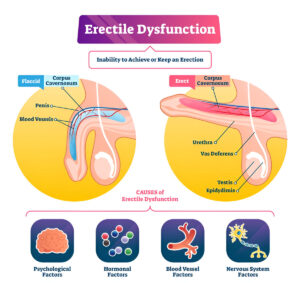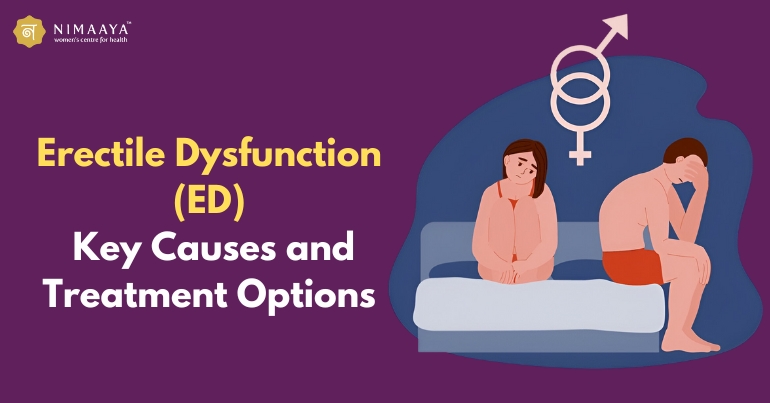What is erectile dysfunction?
Erectile dysfunction (ED), sometimes called impotence, is the inability to develop or sustain an erection that is sufficiently rigid for coitus. ED is a common ailment, particularly among men aged 40 and above; however, it also affects younger men. Although the distress caused by ED has been significant, an understanding of its causes, risk factors, and treatment options may motivate an individual to seek care and restore confidence in sexual health.
Physiology of an Erection
The erection is the result of intricate interactions between the vascular, neurological, hormonal, and psychological systems. Here is a working model:
- Sexual Stimulation: Physical or psychological stimulation causes the brain to send signals to the penile nerves.
- Vasodilation: Nerves release nitric oxide, which relaxes the smooth muscles in blood vessels of the penis and increases blood flow.
- Blood Trapping: The spongy tissues fill blood within (corpora cavernosa) and hence enlarge and become stiff. The veins will compress and trap blood for maintaining the erection.
- Detumescence: After ejaculation or stimulation is halted, blood starts flowing out and the penis returns to the flaccid position.
Any disturbance in one of these steps results in erectile dysfunction.
Erectile Dysfunction Causes

ED can be categorized into two main types: organic and psychogenic. The disease is frequently caused by a confluence of causes.
Organic Causes
Organic erection dysfunction has primary physical causes or physiological mechanisms, which stop natural erection, such as:
- Vascular Causes: Decreased blood flow due to atherosclerotic plaques or changes in blood pressure, along with diabetes are therefore cardiovascular diseases.
- Neurologic Causes: Diseases such as multiple sclerosis or Parkinson’s, but also injuries to the spinal cord, may interfere with signals going to such an organ.
- Hormonal Causes: Low testosterone level, thyroid disorders, or high prolactin levels can disrupt sexual function.
- Medications: Some drugs intended for hypertension, depression, or prostate conditions may have adverse effects causing ED.
- Lifestyle Factors: Some of them include smoking, drinking too much alcohol, and abusing drugs, which all endanger vascular health and the ability to obtain an erection.
- Chronic Diseases: Include chronic advanced kidney disease or chronic advanced liver disease.
Psychogenic Causes
Younger men are notably affected by psychogenic issues. These are some of them:
- Stress and Anxiety: Such situations include workplace pressure, worries about finances, or issues in love.
- Depression: Often associated with the dying of sexual impulses and interests in the act.
- Performance Anxiety: Fear of failure creates a vicious cycle of erectile dysfunction.
- Trauma: Past sexual abuse or trauma may also contribute to ED.
Erectile Dysfunction Symptoms
An overall inability to achieve and sustain an erection is the hallmark of erectile dysfunction. Associated features can be:
- Reduced drive for sex.
- Inability to obtain an erection even when stimulated enough.
- Inability to hold an erection during intercourse.
- psychological depression, including low self-esteem, frustration, or humiliation.
Few difficulties in erecting may be regarded as normal and should not on such grounds be hastily classified as ED on the contrary, persistent problems over a long duration are more suspicious.
Risk Factors for Erectile Dysfunction
There are several factors that increase the chances of developing ED:
- Age: Risk increases with age as vascular and hormonal health deteriorates.
- Medical Conditions: Most significant risk factors include hypertension, diabetes, obesity, and heart diseases.
- Lifestyle Habits: Smoking, lack of exercise, and also poor diet increases the risk of ED.
- Psychological Conditions: Contributory factors leading to ED include chronic stress and several mental health conditions.
Diagnosis of Erectile Dysfunction
A thorough evaluation is crucial for diagnosing the underlying cause of ED. This involves:
-
- Medical History: Discuss symptoms, medical conditions, medications, and lifestyle with your healthcare provider.
- Physical exam: Signs of hormonal imbalance or structural abnormalities.
- Laboratory tests: Testing of blood for testosterone levels, cholesterol, blood sugar, and thyroid functions.
- Specialized Tests:
-
- Nocturnal penile tumescence (NPT) studies to assess spontaneous erections during sleep.
- Blood flow to the penis is measured by Doppler ultrasound scans.
- Psychological assessment identifies mental health issues that contribute to ED in patients.
Read More: Test Tube Baby: A Comprehensive Guide
Erectile Dysfunction Treatment Options
Be sure to get a clinical diagnosis for treatment: All other treatments can be modeled after the cause of ED. This has been possible even once lifestyle modification, medications, or advanced therapy could lead to improvements.
1. Lifestyle Modifications
- Healthy Diet: The main components of any diet should be fruits, vegetables, whole grains, and lean proteins. Limit the consumption of processed food.
- Regular Exercise: Improve vascular system health, testosterone, and decrease stress.
- Quit Smoking: Smoking leads to damaged blood vessels and consequently worsens ED.
- Limit Alcohol: Alcohol use in excess usually blocks nerve function and reduces testosterone.
- Stress Control Methods: Use meditation, yoga, or counseling as ways to aid in reducing such psychological triggers.
2. Medications
- PDE5 Inhibitors: These include sildenafil, tadalafil, and vardenafil, which work to ensure blood flows to the penis and become the first choice in most men with ED.
- Hormonal Therapy: This could be in the form applying testosterone replacement therapy (TRT) for the man with low levels of testosterone.
- Other Medications: It involves the injection of alprostadil or inserting urethral suppositories for an erection.
3. Psychological Counseling
For men who have psychogenic ED: Psychotherapy may help them with the psychogenic issues of etiology. Cognitive-behavioral and couple therapy may help greatly.
4. Devices
- Vacuum Erection Device: A mechanical pump creates a vacuum around the penis so that blood can be drawn into its tissues to cause erection.
- Penile Implants: These are the last resort for men who do not respond to other treatments. Here, there are two varieties- inflatable and semi-rigid devices.
5. Advanced Therapies
- Low-Intensity Shockwave Therapy (LiSWT): Inducing angiogenesis (new blood vessel formation) in the penile tissue.
- Platelet-Rich Plasma (PRP) therapy: Enhancing regeneration and improving vascular repair via the patient’s plasma.
6. Surgery
In cases of penile vascular issues, procedures like penile revascularization can restore blood flow.
Prevention of Erectile Dysfunction
- Not all cases of its occurrence are preventable, but living in a healthful manner reduces its chances. Some important preventative measures include:
- A healthy weight.
- Self-management of chronic conditions like diabetes and hypertension.
- Exercise regularly.
- Avoid smokes, and limit alcohol use.
- Active engagement in mental health.
The Role of Nimaaya IVF Center in Addressing ED and Reproductive Health
Erectile dysfunction is associated not only with sexual health but also with fertility and quality of life. It becomes imperative to treat it if caused by ED in the pair’s inability to conceive. Large centers dealing with fertility, such as Nimaaya IVF hospital, have treatments specific to problems with reproductive health. It has aspects of more holistic management, combining advanced medical interventions with emotional support, with involving people and couples dealing with issues like ED and infertility.
As an organization fostering a compassionate and innovative environment, Nimaaya IVF hospital empowers people to take control of their reproductive health and achieve their parenthood goals. Whether counseling, medical treatment, or assisted reproductive techniques offers the solution, the dedicated team ensures that every patient receives the personalized care and attention needed to see positive results.
Visit Here: Symptoms of Male Infertility | ICSI Treatment


